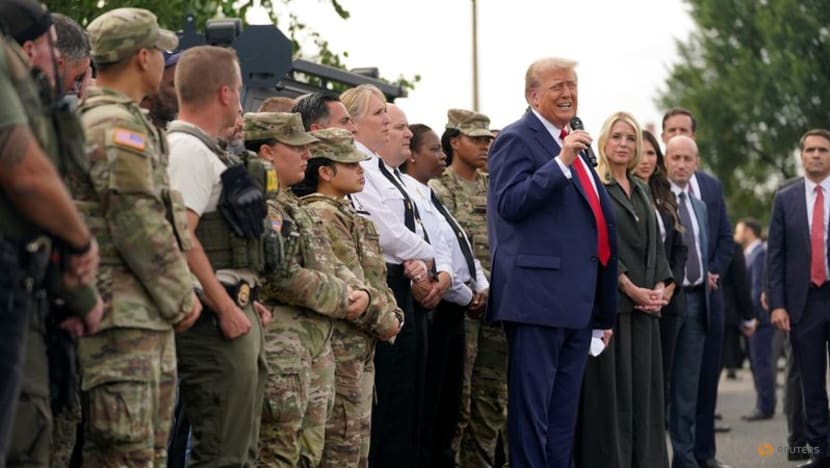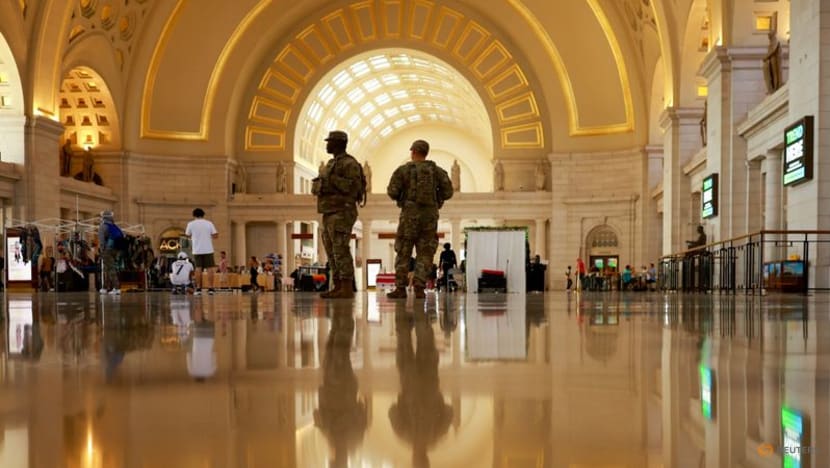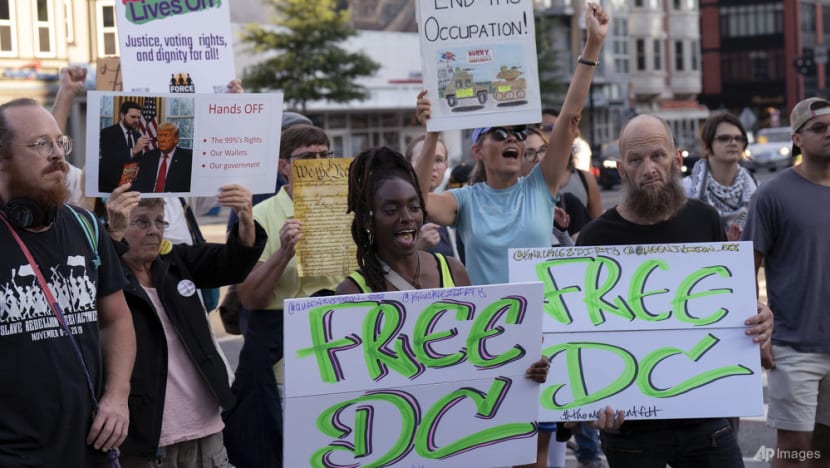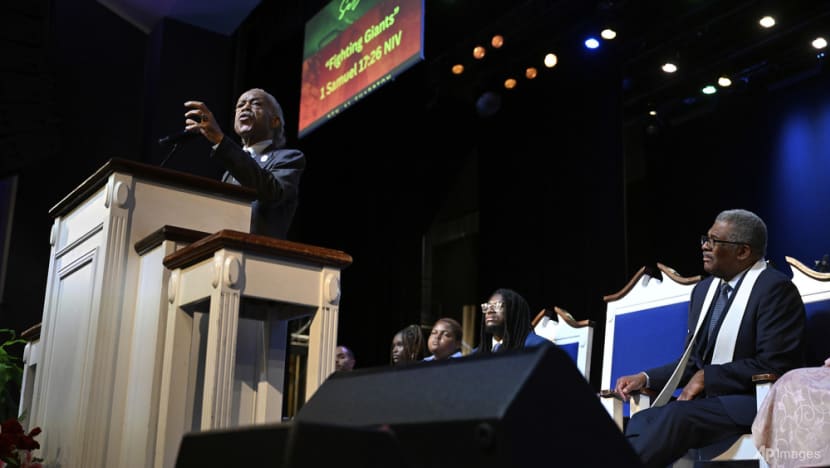Trump expands cities targeted for possible military deployment to Baltimore in spat with governor

WASHINGTON: US President Donald Trump on Sunday (Aug 24) threatened to expand his military deployments to more Democratic-led cities, responding to an offer by Maryland's governor to join him in a tour of Baltimore by saying he might instead “send in the troops”.
Last week, Trump said he was considering Chicago and New York for troop deployments similar to what he has unleashed on Washington DC, where thousands of National Guard and federal law enforcement officers are patrolling the streets of the nation's capital.
Trump made the threat to Baltimore in a spat with Maryland governor Wes Moore, a Democrat who has criticised Trump's unprecedented flex of federal power aimed at combatting crime and homelessness in Washington.
Moore last week invited Trump to visit his state to discuss public safety and walk the streets.
In a Truth Social post on Sunday, Trump said Moore asked “in a rather nasty and provocative tone”, and then raised the spectre of repeating the National Guard deployment he made in Los Angeles over the objections of California's Democratic governor Gavin Newsom.
"Wes Moore’s record on crime is a very bad one, unless he fudges his figures on crime like many of the other ‘Blue States’ are doing," Trump wrote, as he cited a pejorative nickname he uses frequently for the California governor.
“But if Wes Moore needs help, like Gavin Newscum did in LA, I will send in the ‘troops’, which is being done in nearby DC, and quickly clean up the crime.”
Moore said he invited Trump to Maryland “because he seems to enjoy living in this blissful ignorance” about improving crime rates in Baltimore.
“The president is spending all of his time talking about me,” Moore said on CBS's Face the Nation programme on Sunday. “I'm spending my time talking about the people I serve.”
In July, the Baltimore police department said there had been a double-digit reduction in gun violence compared to the previous year. The city has had 84 homicides so far this year, the fewest in over 50 years, according to its mayor.
Democratic House of Representatives Minority leader Hakeem Jeffries also said on Sunday that Trump does not have the authority to deploy troops to Chicago, as the Pentagon carried out initial planning for a possible deployment.
Trump, a Republican, previously said he would probably expand his crime crackdown to Chicago, intervening in another city governed by Democrats.
US officials, speaking on the condition of anonymity, said there had been initial planning at the Pentagon about what a deployment of National Guard troops to Chicago would look like.
One official said the plans were part of the military's efforts to anticipate any requests by Trump and noted senior Pentagon officials have not yet been briefed on them. It is not uncommon for the Pentagon to plan for potential deployments before formal orders are given.
Jeffries said any move to deploy troops to Chicago was an attempt by Trump to manufacture a crisis. Crime, including murders, has declined in Chicago in the last year.
"There's no basis, no authority for Donald Trump to potentially try to drop federal troops into the city of Chicago," Jeffries told CNN's State of the Union programme on Sunday.
Jeffries cited comments made by JB Pritzker, the Democratic governor of Illinois, which includes Chicago, who said there was no emergency warranting the deployment of the National Guard or other military.
“Donald Trump is attempting to manufacture a crisis, politicize Americans who serve in uniform, and continue abusing his power to distract from the pain he’s causing families,” Pritzker wrote on X.
“We’ll continue to follow the law, stand up for the sovereignty of our state, and protect Illinoisans.”
Some Republican governors have sent hundreds of National Guard troops to Washington DC, at Trump's request. The president has depicted the capital as being in the grip of a crime wave, although official data shows crime is down in the city.
On Sunday, Trump asserted without evidence that there was now no crime in the city and credited it to his deployment of troops and hundreds of federal law enforcement personnel.

Trump has much less power over Chicago and Baltimore than he does over the District of Columbia, where as president, he holds more sway.
Title 10 of the US Code, a federal law that outlines the role of the US Armed Forces, includes a provision allowing the president to deploy National Guard units to repel an invasion, to suppress a rebellion or to allow the president to execute the law.
Trump cited this provision, known as Section 12406, when he sent National Guard units to California earlier this year to counter protests, over the objections of Governor Gavin Newsom.
In the case of Chicago, which is a so-called sanctuary city, Trump may argue local laws that bar city officials from cooperating with federal immigration agents prevent the president from executing the law, justifying the military presence.
Trump is almost certain to face legal challenges if he uses Section 12406 to send National Guard troops from Republican-led states into Democratic strongholds.

The Washington Post reported on Saturday that the Pentagon has spent weeks preparing for an operation in Chicago that would include National Guard troops and potentially active duty forces.
Asked about the Post report, the White House pointed to Trump's earlier comments discussing his desire to expand his use of military forces to target local crime.
“I think Chicago will be our next,” Trump told reporters at the White House last Friday, adding, “And then we’ll help with New York.”

Trump has repeatedly described some of the nation’s largest cities - run by Democrats, with black mayors and majority-minority populations - as dangerous and filthy. Baltimore mayor Brandon Scott is black, as is Moore. The District of Columbia and New York also have Black mayors.
Reverend Al Sharpton, speaking during a religious event on Sunday at Howard University in Washington, said the guard's presence in the nation's capital was not about crime, adding: “This is about profiling us.”
“This is laced with bigotry and racism,” he later elaborated to reporters. "Not one white mayor has been designated. And I think this is a civil rights issue, a race issue, and an issue of DC statehood.”













